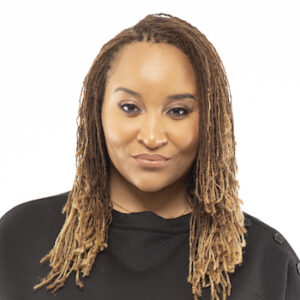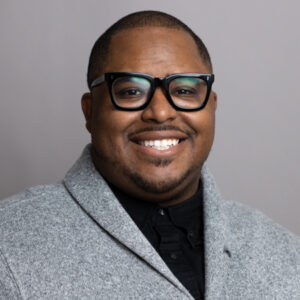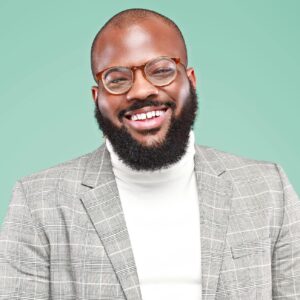Opening Keynote
What does it mean to “matter” as a student affairs professional in 2023? Prompted by shifts in how we work, how we bear witness to ourselves at work, and the role of profession in our lives, join us for this conversation about reimagining student affairs to be more inclusive of the fullness of our being. Drs. Britt Williams, Jon Paul, and TJ Stewart will join Dr. Kedrick Perry in a moderated discussion about how to honor voice and identities to create a culture of “mattering” in the field. We hope this session encourages you to explore the choices made, commitments formed, difficulties encountered, and the joys that fuel your motivation and momentum in and beyond student affairs.
 Dr. Brit M. Williams
Dr. Brit M. Williams
As an Assistant Professor for the Higher Education and Student Affairs Administration program at the University of Vermont, Dr. Brittany M. Williams (she/her) primarily teaches courses on student development theory, college student development, and organizational theory. Her research and teaching expertise broadly examine issues of (in)equity. Specifically, she focuses on career development and supervision issues, identity development (theory and experiences), social class (in)equality, and education as a social determinant of health.
Dr. Williams is a 2022 through 2024 National Academy of Education (NAEd)/ Spencer Postdoctoral Fellow studying Black college women and HIV/AIDS in Metro-Atlanta. Her personal and professional advocacy recently appeared in AIDS United, National Public Radio, Teach for America, the National Black Women’s Health Imperative, and the National Minority Aids Council. She is also a proud co-founder of two digitally rooted co-mentoring communities for Black women: #SisterPhD and #CiteASista.
Prior to joining the professoriate, she served in housing and residence life, career services, academic affairs, and student engagement. Originally from Southwest Atlanta, Georgia, Williams obtained her Ph.D. in College Student Affairs Administration and Graduate Certificate in Qualitative Research from the University of Georgia. She holds her bachelor’s and master’s degree from Hampshire College in Amherst, MA, and Teachers College-Columbia University in New York City, respectively. She is a proud product of Atlanta Public Schools.
 Dr. Jonathan P. Higgins
Dr. Jonathan P. Higgins
Dr. Jonathan P. Higgins (DoctorJonPaul) is an educator, professor, national speaker, freelance journalist, thought leader and media critic who examines the intersections of identity, gender and race in entertainment. Named National Black Justice Coalition’s Inaugural Emerging Leaders to Watch and Business Equality Magazine’s “Top 40 LGBTQ People Under 40”, their work has been featured on sites like Essence, Ebony, Complex, MTV NEWS, Out Magazine, BET & Paper Mag. A Culture Strike 2021 Disruptor and Twitter Spaces Spark Creator, Dr. Higgins is a trailblazer who is creating, sharing, and crafting the stories their ancestors didn’t get to tell.
Dr. Higgins has held positions at both Chernin Entertainment & Edith Productions and currently consults at United Artists, Amazon, and other media leaders. They have worked on inclusion projects with leaders in entertainment including Fox, the NFL, Apple, Disney, Instagram, Buzzfeed and GLAAD. They have also been a featured speaker for SXSW & TEDx and also competed on the latest season of Netflix’s hit show, “Nailed It”.
They are the creator, executive producer and host of the “Black Fat Femme Podcast” which was developed via IHeartMedia’s Next Up Initiative. You can listen to the BFF podcast on IHeartradio, or wherever you get your podcasts. Dr. Higgins holds a doctorate in educational justice from University of Redlands and regularly writes and lectures on what liberation means for Black, queer, fat, non-binary people.
 Dr. TJ Stewart
Dr. TJ Stewart
I have committed my personal, professional, and academic career to engaging radical & power-conscious approaches to transform the world; and I strive to do so through higher education research, practice, and art. I believe that holistic and transdisciplinary approaches are required when doing the hard but necessary work of equity and justice. My work is informed via theoretical/conceptual underpinnings, empirical research, media, and pop culture.
My experience with equity and justice work goes back 10 years and I have significant experience with workshop facilitation, participation in programs related to social justice, social identity, and heritage/awareness months. In addition, I have experience with bias assessment and response and teaching courses as an instructor of record related to social justice and intergroup dialogue, among other topics.
My approach to equity and justice work is tactile and down to earth. I have a foundational belief that to properly implement diversity/inclusion strategy and policy we must first intimately know our organizations and – perhaps more intimately – know the people that make the organization. Doing “this work” requires that we keep our hands, hearts, and minds on the pulse of what is “up” with our students, staff, faculty, and their communities. This work demands the understanding that what happens in the world – not just on our campuses – has an impact on us all.
 Dr. Kedrick Perry
Dr. Kedrick Perry
Dr. Perry has a B.A. in English from the University of North Carolina at Chapel Hill, an M.A. in public administration from North Carolina State University, and a Doctorate in education from the University of Virginia. He began his professional career as Assistant Director of Graduate Diversity Programs at UVA. He then served as the director of Suffolk University’s McNair Program, a post-baccalaureate achievement program that prepares underrepresented and low-income undergraduates for doctoral study, before joining the UC Berkeley staff in 2016 where he served as the Chief Diversity Officer at the Center for Energy Efficient Electronics Science, building a pipeline of diverse graduate students in STEM.
Closing Keynote
 Preston Mitchum
Preston Mitchum
Preston Mitchum (he/him) is a Black queer attorney, advocate, activist hailing from Dayton, Ohio and living in Washington, DC. He is the Founder & Principal of PDM Consulting, a multi-purpose consulting firm focused on the power of Black people, LGBTQ+ people, and young people. Most recently, Preston served as the Director of Federal Advocacy and Government Affairs at The Trevor Project, the world’s largest suicide prevention and mental health organization for LGBTQ young people, and as an Adunct Professor of Law at American University Washington College of Law.
Preston was the first openly LGBTQ Chair of the Washington Bar Association Young Lawyers Division and, in 2021, was voted D.C.’s Most Committed Activist by Washington Blade readers, and runner-up in 2022. He has been featured in Washington Post, BET.com, The Root, The Atlantic, Buzzfeed, CNN, and others. He was named a 2021 Rockwood Fellow for Leaders in Reproductive Health, Rights, and Justice, and was named one of the 2020 Best LGBTQ Lawyers Under 40 by the National LGBTQ+ Bar Association.
Presentation Titled: From “Don’t Say Gay/Trans” to Banning AP African American History Courses: The Coordinated Attack on Black and LGBTQ+ People, Culture, and Identities in 2023 and Beyond
In 2022, more than 220 anti-LGBTQ+ bills were introduced across the United States. Among other things, these bills targeted LGBTQ+ youth’s ability to play sports that aligned with their gender as well as access to gender affirming and trans-related medical care. Last year, we especially saw numerous bills restricting speech and expression in education settings, infamously referred to as “Don’t Say Gay/Trans” bills. At the same time there was an upward trend of anti-LGBTQ bills, state legislatures were introducing bills uplifting white supremacist ideology and attacking critical race theory, and other teachings deemed to be “woke,” in the classroom. Unfortunately, this uptick of attacks on marginalized communities did not stop in 2022.
In 2023, states like Florida banned an AP course on African American studies, a move by Governor DeSantis that’s part of a growing trend of coordinated attacks just in time for elections. Black LGBTQ+ youth, a community particularly susceptible to harm and violence, also face the compounded reality of being attacked at the intersection of race, sexual orientation, and gender identity. This session will elaborate on the uptick in state and federal legislative attacks on Black people and LGBTQ+ youth as well as what this means for this year and beyond.
